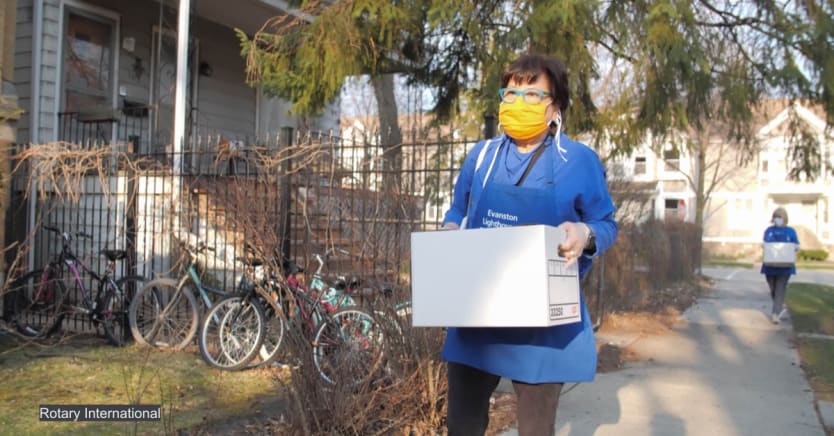
Rotary International has given $35 million in grant funding to provide medical equipment such as ventilators, and personal protective equipment to health care workers in response to the coronavirus pandemic. But the donor organization, known for its work on polio eradication, has decided not to purchase COVID-19 vaccines.
Sign up for Devex CheckUp
The must-read newsletter for exclusive global health news and insider insights.
“We think our strength is really in once those vaccines are available, is how to get them to communities and ensure that communities are comfortable accepting vaccines,” Carol Pandak, director of PolioPlus at Rotary International, told Devex.
Rotary’s global fundraising efforts are still mainly dedicated for polio eradication, with the goal of raising $50 million this year. But the organization’s members in countries can raise funding for COVID-19 response activities. While some are providing support to countries on vaccine introduction, such as through the provision of vaccine storage, others are helping educate communities and dispelling information about COVID-19 vaccines, Pandak said.
Misinformation has been one of the biggest drivers of vaccine hesitancy, including in low and middle income countries. But it’s not always the same across countries, and Rotary members are working at the local level to understand local contexts and needs, Pandak said.
In India, for example, when vaccinations started early in the first quarter of 2021, among the concerns the government and partners have had to deal with revolved around safety of the vaccines, with the perception being that the vaccines were developed too quickly and aren’t safe.
In Nigeria meanwhile, where vaccinations just started mid-March 2021, the government and partners like Rotary are more involved in general sensitization activities on the importance of COVID-19 vaccinations.
“We're really trying to leverage that long history of working with local and state governments on polio, to bring that expertise and experience to bear in this space when vaccines are becoming available,” she added.
Pandak shared with Devex how Rotary clubs are helping dispel misinformation in countries, and if they’re doing anything differently in battling misinformation for COVID-19 compared with polio.
The text below has been lightly edited for length and clarity.
“It really is looking to work with the national and local health authorities to figure out how best Rotary can plug into ... providing that community [with] information and education [on COVID-19 vaccines].”
— Carol Pandak, director, PolioPlus at Rotary InternationalHow are Rotary clubs helping dispel misinformation in countries?
One of our strengths is that we have Rotary members with all sorts of different backgrounds, and so we look to those members to help provide the facts around vaccinations.
We have some Rotarians who have expertise in microbiology and coronavirus … and so, for example, there's a Rotary club member in India who wrote an article dispelling myths about vaccinations and about the COVID vaccine.
In Sri Lanka, the Sri Lanka Rotarians in Colombo worked with their Ministry of Health and the World Health Organization to put together a booklet with factual information about the vaccines. And they made that available to political, community and religious leaders such that they would have the tools that they need to communicate to their constituencies the factual information about vaccinations.
So it's not a one-size-fits-all right, because there's so many different contexts, and there's levels of misinformation in some countries that are different than in other countries. It really is looking to work with the national and local health authorities to figure out how best Rotary can plug into ... providing that community [with] information and education.
How would you compare misinformation on polio to misinformation that's happening today with COVID-19?
It's interesting, because in the two remaining polio endemic countries, there is quite ... a lot of social media and misinformation about vaccinations. And so it's a challenge.
It’s not surprising to me that there is misinformation around COVID. And it’s a little bit different though because we're at a stage in polio where we are very close to eradicating the disease, and so ... perhaps misinformation is concentrated in a couple of countries. Whereas COVID, it's a global phenomenon, and so the misinformation seems to be perhaps more widely spread in ... every country in the world as vaccines become available.
But I do think countering misinformation is probably the same, [in] that you have to address why are people spreading misinformation [about] vaccines and understanding about what is behind that? And then how do you counteract that with factual information?
Are you facing an even more challenging work in combating misinformation in Afghanistan and Pakistan, the two remaining polio endemic countries, now that you have to work on polio, but at the same time COVID-19?
It's still that same messaging of the value of vaccinations, the value of protecting yourself, your family, your community, your children from vaccine preventable diseases.
More on polio vaccination amid COVID-19
► Opinion: COVID-19 should not derail polio eradication efforts
► Polio eradication efforts under threat as vaccine campaigns halted
I think the challenge perhaps in the endemic countries is trying to carry out polio immunization campaigns within the COVID context that requires protection, like you need to wear masks, you need to carry hand sanitizers, you need to maintain some social distancing. [So thinking about] how are you able to carry out vaccination activities safely during the time of COVID.
While there was a brief pause in 2020 — from about March to June-July, for polio immunization campaigns and other immunization campaigns — the program did figure out how to come back safely and resume activities, so that you don't see a huge spike in the number of polio cases or measles or whatever other immunization campaigns are happening.





